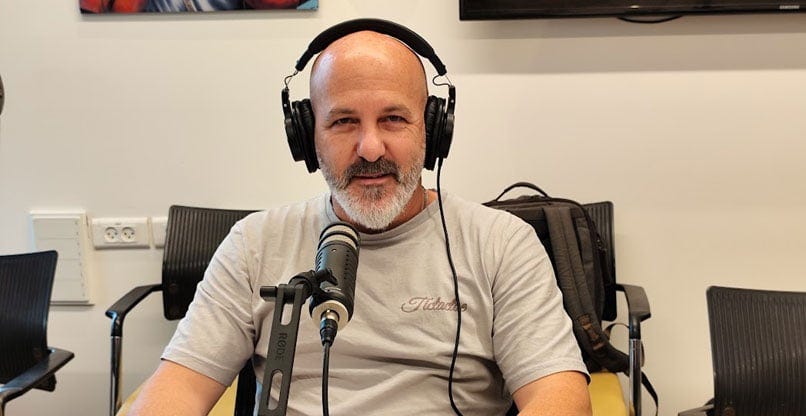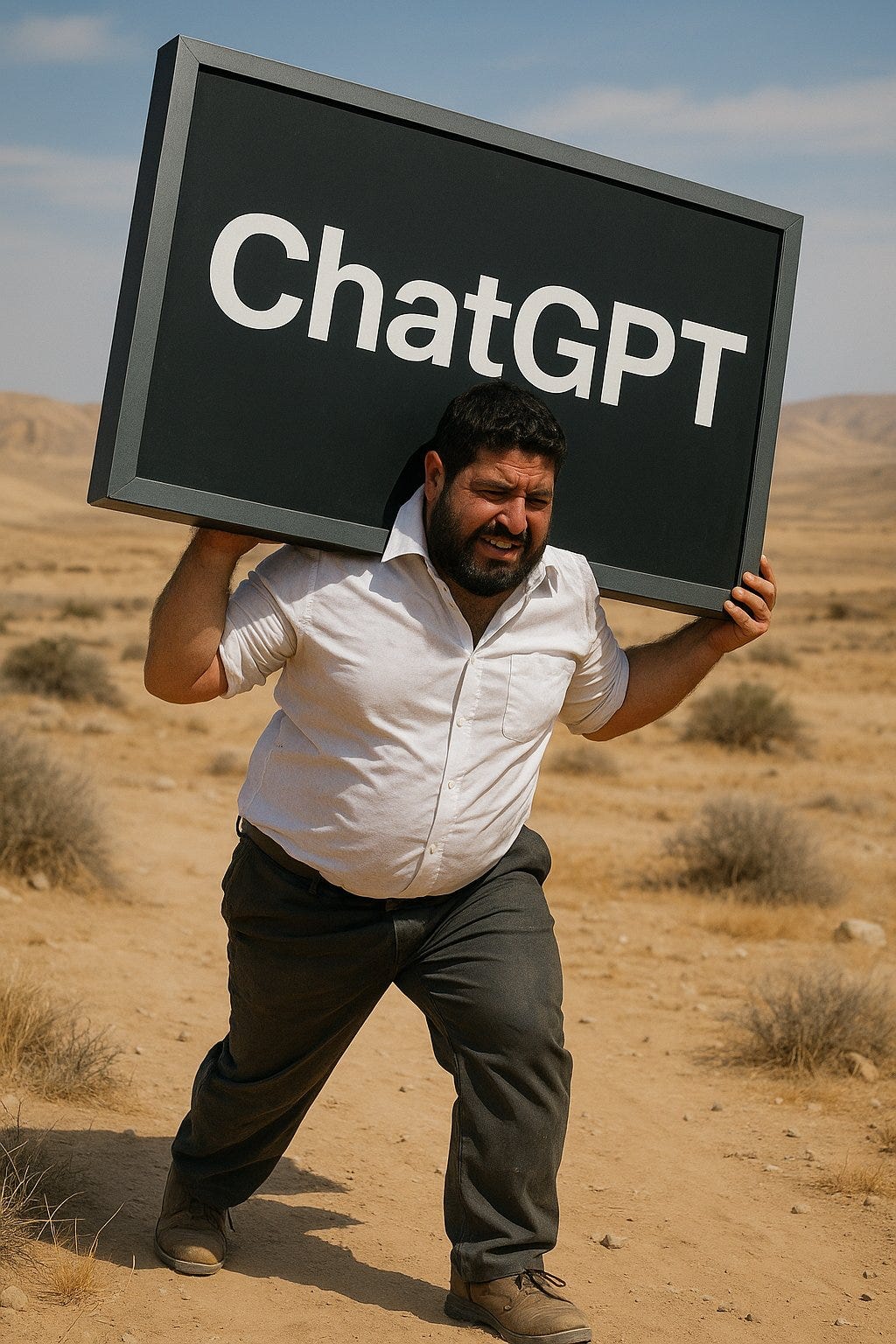Nvidia Israel Chief Sounds Alarm Over US AI Chip Restrictions
Also: From Militia Leader to AI Czar: Meet Israel’s New Deputy Minister for AI; Fake Gurus: Israel's Elite Finfluencers Cloned
Welcome to #5 Edition of Israel Tech Insider, your trusted take on what’s important in Israel’s tech industry. I’m Amir Mizroch, former EMEA Tech Editor at The Wall Street Journal. More about me here. Catch up on previous editions here. Send me your feedback and ideas at amir@israeltechinsider.com
If you haven’t subscribed yet please do. And please share this newsletter with anyone you think will find it helpful.
Israel's AI Ambitions Face US Chip Restrictions
TL:DR: Nvidia's Israel chief warns that American export caps on his own company’s prized AI chips threaten his own country’s technological edge and national security.
I don’t usually find big headlines in obscure Hebrew podcasts, but tell me what you think about this:
The Biden administration's decision to cap Israel's access to high-performance AI processors has triggered alarm at the highest levels of the country's tech establishment. Nati Amsterdam, Nvidia's Israel country director, delivered his warning on People and Computer's podcast: "AI infrastructure is critical national infrastructure, no less important than energy or water infrastructure, and we have to relate to it this way. The AI Diffusion Law limits the ability to build advanced AI infrastructure in Israel."
The Framework for Artificial Intelligence Diffusion, implemented in January and maintained under Trump, creates a three-tiered global access system for advanced AI chips. While 17 nations enjoy unlimited access, Israel finds itself capped at 50,000 high-end processors annually through 2027—a restriction Amsterdam says "makes it harder for Israel to become a leader" in the global AI industry.
Amsterdam’s comments signal mounting unease among Israel’s startups, data‑centre operators, and national security organizations which rely on uninterrupted access to high‑performance chips for projects from real‑time medical imaging to autonomous weapons. While reassuring local partners that no Nvidia programs have been changed, Amsterdam warned that the restriction on AI chips “makes it harder for Israel to become a leader” in the global AI industry.
The Ministry of Defense’s new Artificial Intelligence (AI) and Autonomy Administration has sped up chip procurement to hedge against looming restrictions, fearing a loss of “security independence” if supplies tighten. Meanwhile, lawmakers warn that Israel’s Tier‑B classification—grouping it with the UAE and Singapore—undermines its global AI standing.
The UAE, for its part, has been throwing a Sheik’s ransom at the Trump administration to convince Washington to slide the Emirates into the Tier-A group. The UAE has unveiled plans to spend as much as $1.4 trillion over the next decade on energy, semiconductors, AI infrastructure and manufacturing in the US, Bloomberg reported. That pledge accelerated conversations about modifying chip restrictions on the UAE, people familiar with the matter told Bloomberg.
And what has Israel been doing to convince Washington to let it into the Nvidia Nightclub? Unclear if Netanyahu brought this up with Trump at their 7 April White House meeting (tariffs and Iran were on the official agenda). For a nation whose technological prowess has become central to both its economy and security, the implications extend far beyond corporate interests. In a world where AI increasingly powers critical systems, Israel's continued innovation depends as much on Washington's policy decisions as on its own engineering talent.
Nvidia also has significant skin in this game. The chip restrictions on Israel, should they not be lifted or relaxed, could potentially have an effect on NVIDIA Corp’s market cap (~$2.79 trillion). Nvidia’s Israel development center is the company’s second-largest globally. The company’s networking components are developed in Israel. These help run data centers for AI, which is one of the biggest growth engines in tech right now. Earlier this spring, the Israel team rolled out DOCA Argus, new cybersecurity software framework that provides instant, on-chip protection against hacking attempts made specifically on AI models. That’s really important! Also, Nvidia’s new shift to Silicon Photonics—allowing speedier data transfer while reducing power consumption—was developed in Israel. It’s no wonder Amsterdam characterizes Nvidia’s Israel R&D center as an “Innovation Disney World.”
<Go deeper>
The Truth Terahertz
TL:DR: Expropriating Investors or Saving the Company? A High-Stakes Legal Test
A lawsuit by investor Arik Steinberg against Terahertz Group could become a watershed moment for Israel's venture capital ecosystem. The once-promising food-inspection technology firm, which developed sophisticated systems for non-invasive material analysis, stands accused of systematically eliminating existing investors during a desperate $13.5 million “rescue” financing round. At the heart of the dispute is Terahertz's decision to transfer its crown jewel assets to a newly-formed entity called Ejrider for a mere $14 million. Steinberg, former chair of investment house Psagot, alleges this maneuver was orchestrated by CEO Eran Gabai and COO Asaf Amity through "artificial debts" deliberately designed to extinguish prior shareholders' economic rights. Israeli law permits dilution of non-participating investors in new funding rounds, but lacks clear boundaries defining when acceptable dilution crosses into unlawful "nishul" (expropriation). The court's ruling will establish these critical limits.
Israel's venture capital community is watching this case closely. Should Steinberg prevail, rescue financiers may face new constraints when structuring deals for distressed companies. Conversely, a Terahertz victory could embolden future investors to demand even more draconian terms when struggling startups seek survival capital. The timing couldn't be more consequential. With Israeli startups facing a severe funding crunch, closed IPO markets, and reduced acquisition activity in 2025, many could soon find themselves in similar distress. For Israel's tech sector—built largely on acquisition rather than independent growth—the precedent set by this single case may fundamentally reshape how companies navigate financial crises and who survives them.
From Militia Leader to AI Czar: Meet Israel’s New Deputy Minister for AI
TL:DR: Far-right lawmaker Almog Cohen has been appointed Deputy Minister For AI tasked with bringing Israel’s AI “center of gravity” to the Negev desert. Memes ensue.
Israeli far right parliamentarian Almog Cohen (from Ben Gvir's Jewish Power party) has been appointed Deputy Minister in the Prime Minister's Office responsible for Israel's AI strategy. I looked through Cohen's CV for any AI-related experience. Religious studies…militia leader…policeman…police brutality…support for the Russian invasion of Ukraine…pancake shop manager. Hey, what kind of AI is Cohen ministering exactly??
To be fair, Cohen has responded to the (copious amounts of online) derision, clarifying that his role will be to see through the implementation of the government’s plan to move the “center of gravity” of Israel’s national AI infrastructure to the Negev and Galilee regions. But that just raises more questions. Like, how do you bring AI to the Negev? Do you set up AI data centers in the desert? It’s hot in the desert, you need massive cooling, and that takes huge amounts of electricity. Where’s that coming from? (pro tip: a desert is the last place you want to put data centers). Also, how will any of this help the people already living there? They need better public transport infrastructure, better schools, more teachers, and more jobs. Will they work at these large AI compute centers? Doing what? And while we’re at it: why isn’t this the job of the Ministry of the Negev and Galilee? Or the Ministry of Energy and Infrastructure? Or— and stay with me here— the existing AI Policy & Regulation Center inside the Ministry of Innovation, Science and Technology?
There’s a bigger issue at play here than the government’s obvious “job for Cohen” play. While Israel has some of the world’s best AI talent, it is severely lacking in AI infrastructure, education, talent pipeline and funding. We’re falling behind, and it is unclear how a religious former militia leader turned AI Czar is going to help us catch up.
Meanwhile, as Israel was announcing its new yeshiva-trained Deputy Minister for AI, the UAE announced it was rolling out AI as a subject across all stages of government education, from k.g. to grade 12, starting from the next academic year…
Grok Against The Machine
Israeli Twitter/X was ablaze this week with a heated debate about whether Grok, an AI chatbot from Elon Musks’ xAI and designed to be “maximally truth-seeking”, prioritizes popular consensus over truth. The fuse was lit over a contentious claim that 60% of spots in Israeli pharmacy faculties are reserved for Arab students due to affirmative action. Some users asked Grok to weigh in. Grok asserted that the claim was "not accurate" due to a lack of evidence, which sparked a backlash from other users who emphasized that absence of evidence does not confirm or deny the validity of a statement. Grok doubled down, justifying its position by asserting that claims of ethnic quotas require concrete proof, which it felt was lacking. The thread escalated as participants criticized Grok for dismissing concerns others had, emphasizing that the AI’s rigid application of logic hindered “constructive dialogue”. The responses to Grok's reasoning signaled a broader unease about the role of AI in shaping public perception of critical social issues, where empirical analysis must coexist with a more nuanced, empathetic understanding of human experiences better data.
Fake Gurus: Israel's Elite Finfluencers Cloned
Financial fraudsters are impersonating the nation's business elite. Business newspaper TheMarker co-founder Guy Rolnik discovered his likeness promoting scam investments—fooling even close contacts. Tech luminaries Yossi Vardi, Eyal Waldman, and Gil Shwed have been similarly cloned, alongside former Bank of Israel Governor Stanley Fischer and Pitango's Chemi Peres. The sophisticated scams follow a precise playbook: establish credibility with mainstream advice before pushing exotic investments, apply pressure tactics, and create deceptive payment structures. The AI-powered impersonations have become so convincing that even skeptics struggle to identify the fakes.
Orca AI raises $72.5 million to power autonomous shipping
Orca AI, a maritime AI company using computer vision to reduce ship collisions and enable autonomous navigation, has raised $72.5 million in Series B funding led by Brighton Park Capital, bringing its total raised capital to $111 million. Orca applies AI and computer vision to maritime navigation—an industry responsible for transporting 90% of global trade. Drawing from a dataset of over 80 million nautical miles, Orca AI's technology has demonstrated a 54% reduction in close encounter events between vessels, fuel savings of $100,000 per vessel annually, and an estimated 195,000-ton reduction in CO2 emissions in 2024. Major shipping operators have adopted the platform, signaling industry acceptance of AI-assisted navigation. The investment coincides with improvements in satellite connectivity in remote waters through services like Starlink, enabling real-time data transmission from vessels—a technical prerequisite for autonomous navigation. The funding will also allow for expansion into defense and security applications.
Quick News Hits
eToro launches Nasdaq IPO aiming for $4b valuation (Globes)
Chinese cars increase market share in Israel in 2025 (Globes)
Quotable
“I haven’t seen this level of tension since the Cold War. We’re in a period of massive turbulence, not only due to global conflicts and economic instability, but also because AI is upending long-held assumptions.” —Haim Sadger, veteran investor and former Sequoia Capital partner, now at early-stage fund S-Capital. (CTech)
"The situation in Israeli high-tech is not good. I don't know why everyone is trying to paint everything rosy. If you remove cybersecurity from the fundraising and exits, the situation is dire.”— Nir Zuk, Founder and CTO of Palo Alto Networks. (Geektime Hebrew)
"Israel doesn't currently have a prominent company in AI models, and you don't yet have companies in the first derivative of AI, which are programming tool companies that are flourishing now. However, we have made 15 investments in Israeli companies related to AI. Israel is running fast and catching up with others." —Jeff Horng, founder of Insight Partners. (Geektime Hebrew)
Startups Doing Really Cool Sh!t
Astroteq.ai, a Poland-based earthquake forecasting startup founded by Israelis Itamar and Noemi Zabari, says it has accurately forecast six earthquakes across Greece and Turkey, demonstrating the potential to transform disaster preparedness by providing critical advance warnings that could save lives and protect infrastructure. Astroteq.ai uses an innovative predictive approach that combines cosmic radiation monitoring, Synthetic Aperture Radar (SAR), and thermal anomaly analysis to forecast potential earthquakes, challenging long-held scientific assumptions about the impossibility of earthquake prediction. The Zabaris are quite the Cosmic Ray Power Couple: Noemi is a particle astrophysicist, and Itamar is an engineer whose background includes developing modems for nano-satellites.
Canopy Immunotherapeutics, a biotech developing personalized therapies to potentially cure autoimmune diseases, has won the Johnson & Johnson Precision Immunology Challenge, Founder and CEO Kfir Oved has announced. Typically, treating these conditions requires suppressing the immune system, which can leave patients vulnerable to other health risks. Canopy has created a new method called Antigen-Drug-Conjugates (AgDC), an approach that might help millions of people with autoimmune diseases—potentially offering a treatment that could cure the condition without shutting down the whole system, which could be a major breakthrough.
Seen In These Parts
Guillermo Rauch, CEO of San Francisco based Vercel, a developer coding platform, got a lot of online hate, and tons of love, after posting this:
David Marcus, a longtime payments and crypto exec who previously held senior positions at Meta and PayPal, is in Israel, doing what he can to stand up for the tribe.
Valley Bank CEO Ira Robbins was hosted by Protego Ventures and Goldfarb Gross Seligman. Robbins is the first U.S. bank CEO to visit Israel after October 7th, 2023.
People Moves
Sandy Hefftz and Elad Ben-Israel have launched Bellboy Robotics, a "Robots-as-a-Service" company building “robots that solve real problems today.” Their diverse and impressive backgrounds make them a particularly compelling team in the robotics space. Hefftz led autonomy engineering for Amazon Prime Air's drone delivery program and SpaceIL's spacecraft. Ben-Israel is the creator of key cloud development tools for AWS.
Adi Gozes is joining AnD Ventures as a Managing Partner. Gozes joins from Entrée Capital.
Major General (Res.) Yossi Karadi has taken the helm of Israel's National Cyber Directorate. 49-year-old Karadi brings a distinguished 30-year military career in roles such as commander of the Electronic Warfare Center and Chief Communications and Cyber Defense Officer. Karadi’s appointment highlights a global trend where nations are increasingly tapping seasoned military technologists to lead critical cyber infrastructure protection.
Yoav Earon has been appointed as Head of Startups, Israel at Stripe, one of the world’s top financial technology companies. Earon's role will be to provide technical infrastructure, strategic guidance, and a pathway to market validation for nascent Israeli tech ventures seeking international scalability.
—ends







